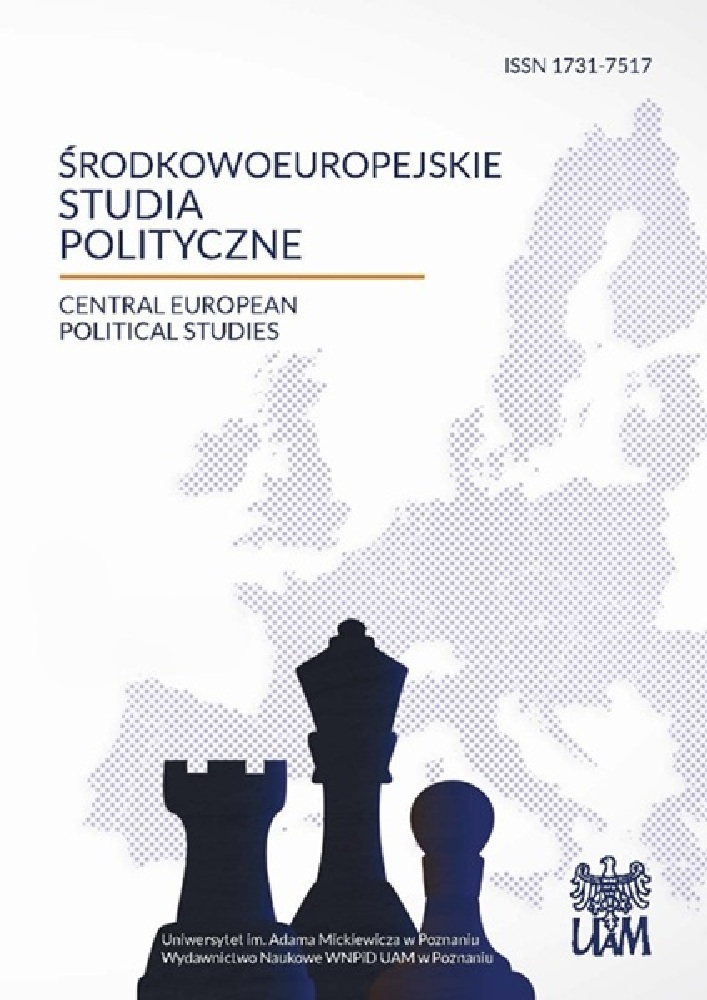Abstract
Basing on the analysis of available statistical data, this article presents Polishwomen’s participation in the processes of exercising political power (legislative and executive) within central institutions of the state. The analysis covered a time frame between 1989 and 2015. The reasons for disparities between the numbers of women and men in political authorities as well as its possible consequences have also been illustrated. The received results allow arriving at the following conclusions. In the analysed period, a considerable increase in the number of women in both chambers of the Polish parliament and the subsequent governments was observed. However, the numbers are still far from political parity. In case of the government, the increased presence of women holding posts of the heads of ministries for affairs traditionally linked with feminine activity (e.g. culture, education, social policy) can also be underlined.
Inequality within the area of exercising political authority may exert a significant
impact on the society, i.e. limit the ability to shape the state policy within areas
particularly interesting to women or reinforce gender stereotypes in the society.
References
Cześnik M. (2007), Partycypacja wyborcza w Polsce, Wydaw. ISP PAN, Scholar, Warszawa.
Database on Women and Men in Decission-making – Europa (2010), http://www.ec.europa.eu/social/BlobServlet?docId=4481&langId=en, 15 V 2016.
Diagnoza społeczna, raporty (2015), red. J. Czapiński, T. Panek, http://www.diagnoza.com, 15 V 2016.
Fuszara M. (2006), Kobiety w polityce, Trio, Warszawa.
Kamola-Cieślik M. (2009), Działalność kobiet w Radzie Ministrów w latach 1989–2008, w: Kobiety we współczesnej Europie, red. M. Musiał-Karg, Wydawnictwo A. Marszałek, Toruń.
Koźbiał K. (2016), Women’s participation in political bodies at the central level in the Viegrad Group countries, w: Women’s role and their participation in the public life of the Visegrad Countries, red. M. Musiał-Karg, E. Lesiewicz, Wydawnictwo Naukowe WNPiD UAM, Poznań–Usti nad Labem.
Kwiatkowska A. (2006), Charakterystyka społeczno-demograficzna polskiej elity rządowej 1997–2004, w: Elity rządowe III RP. Portret socjologiczny, red. J. Raciborski,Trio, Warszawa.
Musiał-Karg M. (2009), Kobiety w organach władzy ustawodawczej i wykonawczej, w: Kobiety we współczesnej Polsce, red. M. Musiał-Karg, Wydawnictwo A. Marszałek, Toruń.
Musiał-Karg M., Lesiewicz E. (2016), Women’s prticipation inlegislative and executive institutions in the European Union and in Visegrad Group countries, w: Women’s role and their participation in the public life of theViserad Countries, red. M. Musiał-Karg, E. Lesiewicz, Wydawnictwo Naukowe WNPiD UAM, Poznań–Usti nad Labem.
Nalewajko E. (2010), Partyjne bariery awansu kobiet w polityce, w: Kobiety u władzy, red. I. Pańków, B. Post, ISP PAN, Warszawa.
Norris P., Inglehart R. (2002), Cultural Barriers to Women’s Leadership: A Worldwide Comparison.
Pająk B. (2006), Płeć a kariera polityczna, „Przegląd Politologiczny”, nr 4.
Pająk-Patkowska (2011), Psychologiczne uwarunkowania aktywności politycznej kobiet, „Przegląd Politologiczny”, nr 2.
Pająk-Patkowska B. (2012), Stereotyp kobiety i polityka – stagnacja czy ewolucja, w: A. Balczyńska-Kosman, I. Andruszkiewicz, J. Kałużna, E. Kania, Gender jako determinanta w przestrzeni prywatnej i publicznej, Wydaw. WNPiD UAM, Poznań.
Pająk-Patkowska B. (2016), Kobieta jako podmiot i przedmiot wpływu społecznego, w: Wpływ społeczny – konteksty i zastosowania badawcze, red. B. Pająk-Patkowska, Wydaw. WNPiD UAM, Poznań.
Philips A. (2003), Przestrzeń publiczna, życie prywatne, w: Aktorzy Życia publicznego. Płeć jako czynnik różnicujący, red. R. Siemieńska, Wydaw. Naukowe Scholar, Warszawa.
Raciborski J. (2006), Konstruowanie rządów i elit rządowych, w: Elity rządowe III RP. Portret socjologiczny, red. J. Raciborski, Trio, Warszawa.
License
Copyright
© 2016, Uniwersytet im. Adama Mickiewicza w Poznaniu, Wydawnictwo Naukowe Instytutu Nauk Politycznych i Dziennikarstwa
OPEN ACCESS
